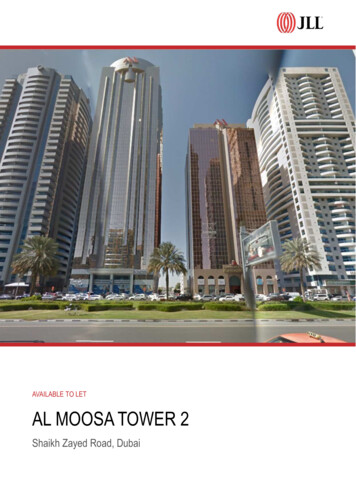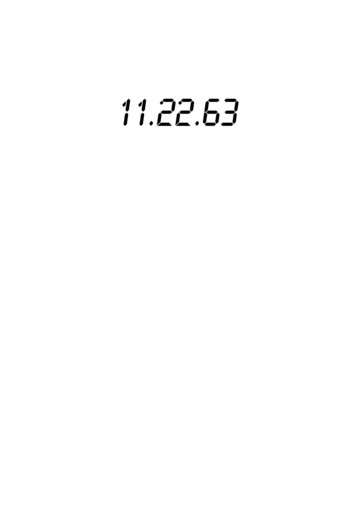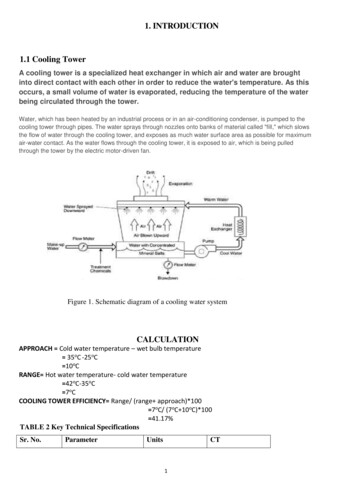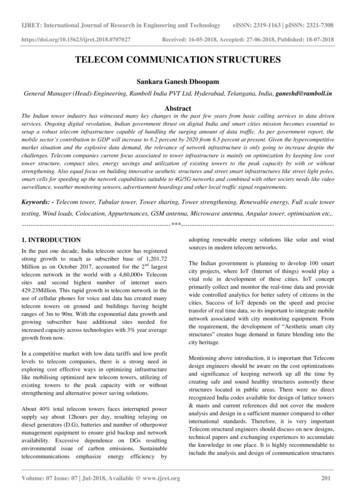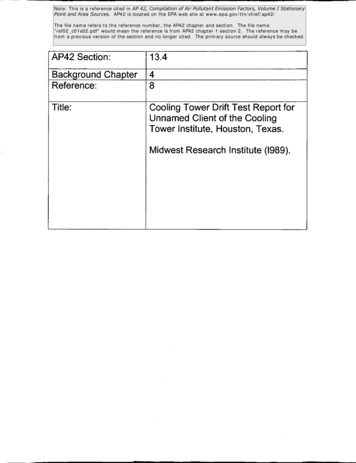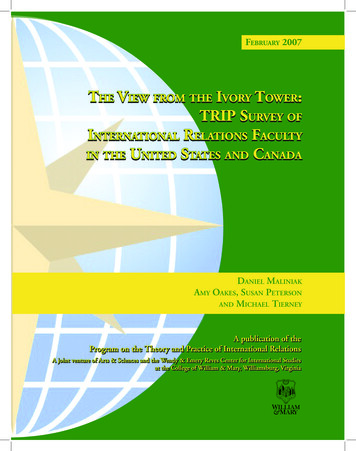
Transcription
February 2007The View from the Ivory Tower:TRIP Survey ofInternational Relations Facultyin the United States and CanadaDaniel MaliniakAmy Oakes, Susan Petersonand Michael TierneyA publication of theProgram on the Theory and Practice of International RelationsA joint venture of Arts & Sciences and the Wendy & Emery Reves Center for International Studiesat the College of William & Mary, Williamsburg, Virginia
The View from the Ivory Tower: TRIP Survey of InternationalRelations Faculty in the United States and CanadabyDaniel MaliniakAmy OakesSusan PetersonMichael J. TierneyCollege of William and Mary, Williamsburg VAFebruary 2007We thank the 1,112 International Relations scholars who generously gave their time to fill out ourdetailed survey. For assistance in designing the survey, identifying our sample, providingtechnical support, and extensive comments in the pre-test phase we thank our colleagues andstudents: Will Armstrong, TJ Cheng, Greg Cooper, Drew Cramer, David Dessler, ArmanGrigorian, Jennifer Keister, Maurice Kent, Rob Landicho, James Long, Alex Miller, Scott Parks,Brad Potter, Ron Rapoport, Danielle Salvaterra, Jess Sloan, and Kaity Smoot. For providing newideas, taking a beta version of the survey, and/or providing feedback on substance and mechanicswe thank Dave Auerswald, Debbie Avant, Mlada Bukovansky, Bridget Coggins, Mike Desch,Dan Drezner, Jim Fearon, Marty Finnemore, Yoav Gortzak, Peter Haas, Darren Hawkins, BethKier, Mike Lipson, Octavius Pinkard, Dan Nexon, Steve Rothman, Holger Schmidt, Phil Schrodt,Steve Shellman, Dominic Tierney, Catherine Weaver, and Patricia Weitsman. Finally, we thankthe Department of Government, the Roy R. Charles Center, Arts and Sciences, and the RevesCenter for International Studies at the College of William and Mary for financial support. Formore information on the Program on the Theory and Practice of International Relations, whichsponsored this research, see http://www.wm.edu/irtheoryandpractice/
The View from the Ivory Tower: TRIP Survey of InternationalRelations Faculty in the United States and CanadaJ. David Singer (1985, 245) has commented that “[s]pecialists in world affairshave a special responsibility to address the major problems confronting the globalvillage.” Have international relations (IR) scholars heeded his call to arms and sought tomake their teaching and scholarship policy relevant? Or, as Hans Morgenthau (1970,261) lamented, do they resemble “a deaf man answering questions which no one hasasked him.” The Teaching, Research, and International Politics (TRIP) survey examineswhether the major foreign policy debates that concern policymakers influence thequestions IR scholars explore in their classrooms and in the pages of their publicationsand, in turn, whether and how IR scholars might influence the foreign policy process.The TRIP faculty survey, in short, investigates IR scholars’ views on teaching, thediscipline, and contemporary issues in international politics.This faculty survey is one part of a larger TRIP project designed to study therelationships among teaching, research, and foreign policy.1 The survey data issupplemented by a second large empirical project: a database of all international relationsarticles published in the twelve top peer-reviewed IR and political science journals from1980 to 2006.2 With these two types of data scholars will be able to describe changes inthe discipline over time, observe variation in research and teaching practices acrossdifferent countries and regions of the world, identify and analyze network effects, andidentify areas of consensus and disagreement within the IR discipline. These data alsocan help us to understand the impact of academic research on foreign policy, the impactof research on teaching, the influence of teaching on foreign policy opinions of students(and future policy makers), the impact of specific policy outcomes and real world eventson both teaching and research, and a variety of other issues that have previously been thesubject only of speculation.3In this report, we describe the results of the 2006 TRIP survey of IR faculty. Inthe fall of 2004 we conducted the most extensive and systematic survey to date of IRscholars in the United States. Two years later, in the fall of 2006, we followed up thatsurvey to track changes in views and practices of IR scholars. The 2006 survey contained36 new questions that were not included in the prior survey, and we expanded thegeographic scope of our survey to include scholars at both U.S. and Canadian collegesand universities.4 This report contains descriptive statistics for every question in the 20061In the fall of 2006 we conducted parallel surveys on U.S. college students and U.S. registered voters thatmeasured opinions on many of the policy variables identified in the faculty survey.2For further information on these two studies, see http://www.wm.edu/irtheoryandpractice/3For additional background on the project, see Peterson et al. 2005a.4We will conduct this survey every two years, and we plan to expand the geographic scope of the survey toinclude IR scholars at colleges and universities in other regions of the world.2
survey and enables comparisons between the U.S. results from 2004 and 2006;5 it alsoallows for comparisons between the U.S. and Canadian results from 2006.MethodologyWe attempted to identify and survey all faculty members in four-year colleges anduniversities in the United States and Canada who do research in the sub-field ofinternational relations or who teach courses on international relations. This meant thatthe overwhelming majority of our respondents have jobs in departments of politicalscience, politics, government, social science, or professional schools associated withuniversities. Naturally, this meant that we excluded many researchers who are currentlyemployed in government, private firms, or think tanks.For the survey conducted in the United States we used a list compiled by U.S.News and World Report to identify all four-year colleges and universities in 2005-2006.There were 1,199 such institutions. We also included the Monterey Institute and sevenmilitary schools that were not rated by USNWR but did have a relatively large number ofpolitical science faculty who taught courses on international relations.6 We then foundthe IR faculty members teaching at these schools through an extensive and thoroughseries of web searches, email contacts, and phone calls to department chairs, secretaries,and individual scholars.By early August 2006 we had identified 2,838 individuals who appeared toresearch and/or teach international relations at these institutions. On August 25, 2006 webegan sending emails to each of these individuals, asking them to fill out an online surveythat would take “roughly 22-30 minutes.” We provided a live link to a web survey thathad four sections: Teaching International Relations (questions 1-12 below), TheInternational Relations Discipline (questions 13-30 below), Research Interests (questions31-55 below), and Views on Foreign Policy (questions 56-83). We promisedconfidentiality to all respondents, so that no answers could be publicly linked to anyindividual respondent. For respondents who did not complete the survey, we sentadditional reminder emails between September 6, 2006 and October 20, 2006. If arespondent contacted us and asked for a hard copy or did not have an email address, wesent a hard copy of the survey via regular mail.7 One hundred thirty-three respondents ortheir agents informed us that they did not belong in the sample because either they hadbeen misidentified and did not teach or do research in the field of international relations,or they had died, changed jobs, or retired. These individuals were not included in our5There are 26 questions that were asked on the 2004 survey that were not asked on the 2006 survey. Forreaders interested in viewing the 2004 questions and results not included herein, see Peterson et al. 2005a.6These institutions, such as the National War College and the Army War College, were not included in theoriginal sample because they do not have undergraduate programs. However, we chose to include theseschools in the 2006 survey because we were interested in comparing the opinions and practices of facultyteaching civilian undergraduates with those teaching military officers. There were 36 respondents fromthese institutions.7We sent 20 hard copies of the survey and received 17 completed hard copy surveys.3
calculation of the response rate. In all, 1,112 scholars responded to the U.S. version ofthe survey, either online or through the mail. Certainly, there are additional individualswho were misidentified by our selection process but who never informed us. Hence, ourresponse rate of over 41 percent is a conservative estimate.The survey was conducted over the same time period in Canada. It was identicalto the U.S. survey except in the “Views on Foreign Policy” section, where we substitutedthe word “Canada” for “U.S.” when appropriate.8 To identify the population of IRscholars in Canadian colleges and universities we used a comparable method. MacleansMagazine provides an annual ranking of all four-year universities in Canada. There were93 such schools. We used an identical method – that is, web searches that weresupplemented by emails and phone calls – to identify faculty members who wereteaching or doing research in IR. After removing those who identified themselves as notbelonging in the population, we achieved a 40 percent response rate; 110 of the 275 IRscholars at Canadian institutions answered the survey.There was some variation in response rate based on type of institution—nationalresearch universities had the highest response rate at 47 percent, while masters grantinginstitutions, liberal arts colleges and bachelor granting institutions were lower with 33, 41and 37 percent, respectively. On an individual basis, as in 2004, we found that responserates among the most prominent scholars in the field were significantly higher thanamong the rest of the population. For the U.S. survey, of the top 25 (living) scholarsrated as having “the largest impact on the field over the past 20 years” (see question 14),88 percent of those who were eligible completed the survey.9 It is impossible to make ananalogous case with the Canadian survey since few scholars located at Canadianuniversities were named among those making the “greatest impact” (question 14) ordoing “the most interesting work” (question 16).10 Almost all the scholars listed byrespondents in the Canadian survey work in the United States or Britain. The exceptionis Robert Cox (#4), who is emeritus at York University.FindingsWhile we could spill a great deal of ink discussing the results for each question,we refrain from in-depth analysis in this report, allowing readers to view the summaryfindings and draw their own conclusions. In a series of working papers and forthcoming8In the next section of this paper describing the results by question, we indicate such changes withfootnotes that specify the differences.9Some economists, philosophers, deceased scholars, and IR scholars at non-American colleges anduniversities were frequently mentioned as having a major impact on the field (for example, HansMorgenthau, Robert Cox, Thomas Schelling, Alexander George), but these individuals did not receive theU.S. survey.10The only scholars at Canadian schools who were among the top 20 on “most interesting work” (question15) were Eric Helleiner and Sandra Whitworth.4
articles we analyze these data at greater length.11 That said, some broad themes and afew noteworthy, if preliminary findings are highlighted here.Stability over TimeThe most striking thing that emerges from a comparison of the results of the2004 and 2006 U.S. surveys is the fact that very little seems to have changed, suggestingthat attitudes about the discipline, teaching, and even policy change very slowly, if atall.12 For example, while IR instructors tend to teach slightly more about the Mid-Eastand slightly less about the former Soviet Union in 2006 than in 2004 (see question 2), theshifts are not large and other regions remain virtually unchanged. Similarly, respondentshave not adjusted how much they discuss each of the major theoretical paradigms inclass, and few have switched paradigms in their own research (questions 7 and 42). Onlythe number of scholars identifying themselves as “constructivist” has increasedmarginally. International Organization remains the top journal in the field; Harvard stillreigns as the top PhD program; Robert Keohane continues to be “the most influential”scholar in the field; the Mid-East is still viewed as the most strategically important regionin the world today, while East-Asia continues to be seen as the key region in 20 years;and IR scholars remain convinced that the war in Iraq will not enhance U.S. nationalsecurity. In fact, while U.S. public opinion has changed dramatically on the Iraq War inthe past two years, IR scholars overwhelmingly believed in 2004 (87 percent) that thewar would hurt U.S. national security and they continue to think so in 2006 (90 percent).Despite the stability in most results, there are some notable changes. Harvardretains its reputation as the top PhD program (question 22), but its lead over the secondranked program drops from 27 percentage points to 13 points. Princeton improves moredramatically than any other program in the survey, moving from fourth to second place.13As a sign of greater dispersion among the top ten or increased competition from lowerranked schools, only two programs in the top ten receive more votes in 2006 than theydid in 2004 – Princeton (#2) increases from 43 percent to 52 percent and UCSD (#9)improves from 16 percent to 20 percent. Among Masters programs (question 23)Georgetown and Johns Hopkins switch places at the top and, as in 2004, are listed much11For a discussion of the questions in the “Foreign Policy Views” section of the survey, see Maliniak et al.2007a. For a paper that analyzes the place of women within the discipline and the effect of gender onpolicy views, see Maliniak et al. 2007b. For a study that compares the views of scholars at U.S. andCanadian colleges and universities, see Lipson et al. 2007. For a paper that compares the opinions of IRscholars as represented in a systematic survey and the opinions of “foreign policy experts” as selected bynewspaper editorial boards, see Peterson and Tierney 2007. For a paper that tests a variety of hypotheseson the delegation of authority to multilateral organizations through the use of public opinion data and thedata presented in this Report, see Tierney 2007.12We do not report any changes at the individual level of analysis in this report. It is possible that manyindividuals changed their views from 2004 to 2006, but that variation in the direction of change simplycancelled out any movement at the group level. More likely, opinions about matters relating to teaching,research, the discipline, and policy simply change very slowly over time.13The only other programs within the top 25 to move up 2 spots are NYU, which moves from 18 to 16, andAmerican University, which moves from 25 to 23.5
more frequently than other schools. Despite this small shift at the top, the rest of the listremains remarkably stable.In response to the question of which journals have the “greatest impact” on theway IR scholars think about their subject (question 17), nine of the same ten journalsappear at the top of the list in 2004 and 2006. The most significant shift within the top tenis the decline of World Politics. Although it slipped just one place from fourth to fifth inthe ordinal rankings, the journal experienced the largest drop (from 37 to 30 percent) inthe percentage of scholars rating it as a top journal. Even more telling is the fact thatwhen asked to rank the best journals in their own area of expertise (question 18), scholarswere even less likely to name World Politics.14 Two non-peer reviewed journals(Foreign Affairs and Foreign Policy) were very highly rated in the 2004 survey. Thesejournals both improve their rankings in 2006: Foreign Affairs jumps from fifth to fourthplace, while Foreign Policy remains at eighth but is named by 18 percent of scholars in2006 compared to 16 percent in 2004.Comparing U.S. and Canadian IRWhile the attitudes of American scholars have changed little over time, there areimportant differences in U.S. and Canadian scholars’ responses to the survey.15 CanadianIR scholars receive their academic training and PhDs largely from Canadian rather thanAmerican universities (question 31). Harvard is the only U.S. university to rank amongthe top five institutions where Canadian scholars received their PhDs, tying for fourthplace with Carleton, McGill, and Alberta. York, Toronto, and British Columbia comprisethe top three schools in the Canadian survey.Canadian scholars also appear to read somewhat different journals than theirU.S. counterparts (questions 17 and 18). They agree with their U.S. colleagues on the topjournals in the field, but a number of other journals—Global Governance, Review ofInternational Studies, European Journal of International Relations, and Millennium—fare much better among Canadian than U.S. respondents. These British and Europeanjournals have a much greater impact on research and teaching in Canada than in theUnited States. Similarly, Canadians read and admire the work of a more eclectic groupof scholars than their U.S. counterparts. Robert Cox, Susan Strange, R.B.J. Walker,Cynthia Enloe, David Campbell, J. Ann Tickner, Steve Smith, Martha Finnemore, JamesDer Derian, Karl Deutsch, Martin Wight, Michael Doyle, and Michael Walzer all appearmuch higher on the Canadian list of the 25 most influential scholars in the field (question14). Other scholars who have had a profound impact on the thinking of researchers atCanadian schools, but who have had a relatively smaller impact on U.S. scholars include:Michel Foucault, Raymond Aron, Cynthia Enloe, David Haglund, Emmanuel Adler,Immanuel Wallerstein, John Rawls, and Steven Gill (question 16).14A similar pattern emerges from the Canadian survey with a decline from 8 to 10. Scholars apparentlybelieve that World Politics is more important in some other area of IR than it is in the area they know best.15For a more detailed analysis of the differences, see Lipson et al. n.d.6
These findings likely reflect the different substantive, methodological, andepistemological philosophies of scholars in the two countries. Where U.S. faculty alignthemselves heavily along the realist-liberal divide, more Canadian scholars chose “other”to describe their primary paradigm than any other answer. Constructivism came in aclose second and ranked higher than both liberalism and realism (question 42). Notsurprisingly, then, U.S. scholars focus more on security issues (question 46) than do theirCanadian counterparts. U.S. IR scholars also are more likely to describe themselves aspositivists (question 50) than are their Canadian colleagues. Indeed, Canadian scholarsare more likely to see epistemology as the major split within the IR discipline, while U.S.scholars see methodology and theoretical paradigms as the principal divides (question27). IR scholars in Canada overwhelmingly describe their research as qualitative and aremore likely to engage in counterfactual analysis, while U.S. faculty are more likely todepict their work as quantitative (question 51).In the classroom, Canadian scholars of IR tend to focus more heavily on theorythan do U.S. faculty. A majority of Canadian respondents say their introductory classesare designed to introduce students to the scholarly discipline of IR, rather than toimportant policy debates (question 4). They devote considerably less time to the study ofthe international politics of particular regions than U.S. scholars (question 3). Perhapsthe most striking difference between the U.S. and Canadian introductory classes are theirsize – Canadian classes are more than twice as large on average compared to theirAmerican equivalents (question 2).Results on new QuestionsThe 2006 TRIP survey included 36 questions not asked in 2004. Many of thesewere added in response to the comments of respondents who took the 2004 survey. Forexample, several respondents argued that books were as important as journals forpublishing research in IR and requested that scholars rank the best presses. While U.S.and Canadian scholars express significant differences about the top journals in the field,they agree on the top book publishers. When asked which presses publish books thathave the greatest impact on the IR discipline (question 19), Cambridge, Cornell, Oxford,and Princeton top the rankings in both countries. Commercial presses such as Routledgeand Lynne Rienner are highly regarded by both groups of scholars and are rated abovemany traditionally prestigious university presses. More telling, perhaps, when asked tolist the presses that publish the best research in their own area of expertise (question 20),both Routledge and Lynne Rienner ranked even higher on both lists.In the 2006 survey scholars were asked for the first time to identify the bestplaces to study international relations as an undergraduate. Despite the fact that manyliberal arts colleges and small universities specialize in undergraduate education, the listthat emerges looks much like those for top graduate programs. The only schools on theU.S. survey in the top 25 without a PhD program are Dartmouth (#9), Swarthmore (#14),7
Williams (#18), William and Mary (#22) and Middlebury (#24).16 Among scholars whoattended non-PhD granting institutions as undergraduates, however, the results changewith three additional undergraduate institutions reaching the top 25: Amherst, BrighamYoung, and Wellesley. These data suggest that scholars who have directly observed thedifferences between undergraduate education at a research university and a teachingcollege are more likely to value the latter.Additional new questions explore class size, pedagogy, whether and whyscholars shift from one paradigm to another in their research, whether scholars work in anunpaid capacity for a government, NGO, or IO, country of origin, and academic status.In addition to these teaching and disciplinary issues, we ask a host of new questions aboutcontemporary policy that touch on global health, the Israel lobby, Iran and North Korea,foreign aid, the definition of victory in Iraq, democratic transitions in post-warenvironments, whether particular wars are just or unjust, and what are the greatest foreignpolicy challenges facing the U.S./Canada today.Below we provide descriptive statistics for each question that appeared on the2006 survey. We report all results by question in the order they appeared on the survey.When available we also provide the 2004 results for comparison.16On the Canadian survey only three schools without a PhD program make the top 25 – Dartmouth (#9),Swarthmore (#15), and William and Mary (#19).8
Section I: Teaching International RelationsCourseIntro IR or its equivalentAmerican PoliticsCanadian Foreign PolicyCanadian PoliticsComparative Foreign PolicyComparative PoliticsEnvironmental PoliticsFormal MethodsGlobal DevelopmentHuman RightsInternational EthicsInternational HealthInternational /Diplomatic HistoryInternational Organization(s)International Political EconomyInternational LawInternational Security18History of the IR disciplineIR TheoryPhilosophy of SciencePolicy AnalysisPolitical TheoryQualitative MethodsQuantitative MethodsTerrorismUS Foreign PolicyOther2004 US87%24%2006 %39%3%6%8%7%11%14%24%24%††2006 10%52%3%7%7%8%3%9%10%14%!AverageMedianStandard Deviationmaxmin172006 US714076.450072006 Canada181122.5172.180015For the 2004 survey, the numbers are a combination of (1)“Have you ever taught Introduction to International Relations (orits equivalent)?” And “ (3) Do you teach courses in any of the following (please check all that apply)?”* Option not available in 2004 survey†Option available on Canadian Survey only18In the 2004 survey, this option was called IR Historiography
"# !%RegionUnited StatesCanada and Western EuropeLatin America (including Mexico)Sub-Saharan AfricaFSU/Eastern Europe, including Central AsiaMiddle East/North AfricaEast Asia (including China)South Asia (including Afghanistan)Southeast AsiaOceaniaNone country or region-specific case studies are not used&2004 US55%44%27%25%35%44%37%19%14%1%32%2006 US54%43%27%27%21%46%39%18%13%1%38%2006 Canada47%50%13%12%8%22%25%8%5%0%48%!!Introduce students to the scholarly discipline of IRBoth, but primarily concerned with introducingstudents to the scholarly discipline of IREqual focus on the discipline and on preparingstudents to be informed participantsBoth, but primarily concerned with preparingstudents to be informed participantsDesigned to prepare students to be informedparticipants in policy debates aboutinternational politics and foreign policy'2004 US9%2006 US4%2006 Canada10%26%35%43%31%30%18%22%25%22%11%6%7%!)(* AverageMedian75-100%50-74%25-49%10-24%1-9%0%2006 US31252004 US4%21%33%34%7%1%2006 Canada32302006 US4%16%43%34%3%1%2006 Canada7%12%53%27%0%2%10
2006 US2725 %2006 Canada28252004 US3%14%30%33%17%3%2006 US4%13%34%41%5%3%2006 Canada7%13%37%37%3%3%/0*!# *% on-paradigmaticOther0%1%2%9%21%*18%23%2004 US1-5%6-10% 0%1-5%11%13%41%37%48%23%16%2006 US6-10% 0%1%1%0.2%0.3%0.2%4%1%19The survey did not contain a question #8. Rather, those respondents who chose "other" in response to question 7 used thisspace to elaborate on their answer.20We did not list "feminism" as a paradigm in the 2004 survey. We included it as an option on the 2006 survey in response toparticipants'comments on the 2004 survey. Of respondents who selected "other" in 2004 to describe the paradigm in whichthey worked, more wrote in feminism than any other answer.11
2%50%38%18%2006 Canada6-10% %0%8%5%Approximately what percentage of your Intro IR class do you devote to studying eachinternational relations paradigm, including the use of that paradigm to answer empiricalquestions? (average)30%US 2006Canada uctivism12FeminismNon-paradigmaticOther
1/!I adjust the content of my course from day to daydepending on events in the world.I adjust my course a few times per semester whenpolicy changes or events warrant.I only make adjustments within the semester in rarecircumstances and only in response to majorevents like 9/11 or the Berlin Wall coming down.I only make adjustments from one semester to thenext because of events in the world.I don’t change my course based on events in the worldbecause the core concepts of IR should beapplicable no matter what2004 US2006 US2006 1YesNoI started teaching after 9/114102004 US21%79%N/A2006 US17%67%17%3* 2006 Canada7%73%20%0The theoretical approaches I taught changed2004 US2006 US2006 CanadaSignificantly5%5%1%Somewhat43%35%39%Not at all52%60%60%The geographic focus of the course changed2004 US2006 US2006 CanadaSignificantly11%7%8%Somewhat51%53%27%Not at all37%41%65%The issue areas covered changed2004 US2006 US2006 CanadaSignificantly19%17%11%Somewhat67%69%70%Not at all14%15%20%13*
52004 2223242525AnswerSeptember 11, 2001/Terrorist acts since thenEnd of Cold War/Break up of the Soviet Union2003 Iraq War – Events leading up to and problem associated with it directlyGlobalization and anti-globalizationGenocide and Ethnic Conflict – including issues in the Former Yugoslavia, Rwanda,Darfur, as well as othersEuropean Integration – social, political, and economic issues associatedwith itBush doctrine/Bush FP – generally those who attribute a change in foreign policy asinfluencing their teaching2006 USAnswerSeptember 11, 2001/ GWOTThe End of the Cold War2003 Iraq WarGlobalizationCivil Wars, Genocide and EthnicConflictRise of ChinaBush Doctrine/Bush FPEuropean IntegrationEnvironmental IssuesWMD Proliferation1991 Iraq WarRise of Latin-American LeftThe Vietnam WarCold WarConflict on the Korean PeninsulaMiddle East ConflictsWTO/Trade DevelopmentsDemocratization IssuesCreation of the ICC and otherHuman Rights TribunalsIslamic IssuesArab-Israeli ConflictNorth-South Divide IssuesAsian financial crisisAIDS/ Pandemic or EpidemicDiseaseRole of TechnologyUN 21919191919Percent74%51%32%19%15%13%11%2006 CanadaAnswerSeptember 11, 2001/ GWOTThe End of the Cold War2003 Iraq WarCivil Wars, Genocide andEthnic ConflictEnvironmental IssuesGlobalizationBush Doctrine/Bush FPWTO/Trade DevelopmentsAnti-globalizationWar in AfghanistanRise of China1991 Iraq WarAsian Financial CrisisCreation of the ICC and otherHuman Rights TribunalsEconomic RegionalismEuropean IntegrationIslamic IssuesMiddle East ConflictsAIDS/ Pandemic or EpidemicDiseaseArab-Israeli ConflictDevelopment issuesIsraeli-Palestinian conflictWMD proliferationPercent58%34%30%20%14%13%10%8%6%6%5%
The Teaching, Research, and International Politics (TRIP) survey examines . while masters granting institutions, liberal arts colleges and bachelor granting institutions were lower with 33, 41 . were Eric Helleiner and Sandra Whitworth. 5 articles we analyze these data at greater length.11 That said, some broad themes and a


